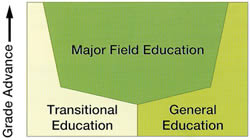- Education and Research System
- Educational and Research Organization
- Curricular Educational System
- Education System
http://www.obihiro.ac.jp/english/education/undergraduate/index.html
Education and Research System
Education at Obihiro University of Agriculture and Veterinary Medicine aims to train students to play an active part as professional workers in many fields of agriculture and animal husbandry. Operating on this principle, since the school’ s founding in 1941 as Obihiro Higher Technical School of Veterinary Medicine, we have been producing many highly competent graduates for society. In 2008, we restructured the School of Veterinary Medicine and the School of Agriculture into the Course of Veterinary Medicine and Course of Agriculture, respectively. Through this restructuring, we will be able to more effectively blend veterinary medicine and animal husbandry in our education, which characterizes Obihiro University of Agriculture and Veterinary Medicine.
In fiscal 2006, our program (General Introductory Education through“School-wide Practical Training in Agriculture and Animal Husbandry”) was adopted under a Ministry of Education grant“Supporting Program for Distinctive University Education”through fiscal 2008. This program offers broad knowledge and experience in agriculture and animal husbandry to students, and helps them decide which area of study they want to specialize in later.
Educational and Research Organization
In order to upgrade an education program that blends veterinary medicine and animal husbandry, Obihiro University of Agriculture and Veterinary Medicine restructured the school system into a course system in fiscal 2008. As for the academic staff re-organization, we have a research faculty consisting of 7 departments and 16 divisions.
As a result of this re-organization, academic staff members who belong to the research faculty can be involved in the curricula in various ways.
In the course system, we have re-organized the former 10 special education units into 6. By setting up this system, the framework of special education can be more flexibly modified or improved according to students’needs or social conditions.
In view of the smooth relationship between education and research, we have set up the“Center for University Educational Affairs”, which is responsible for the planning of curricula and practice of undergraduate and graduate education. This center carries out necessary adjustments between the educational and research organizations. It also supports teachers’class improvement, and students’study environment, etc.
Curricular Educational System

To ensure that every undergraduate student experiences challenging and holistic education, the University has a curriculum through the institution of three levels of learning: general education curriculum (GEC), core curriculum, and major or advanced courses. Regardless of the curricular program of choice, all students are required to take the GEC courses, which introduce them to the University’s vision-mission, history, and the role it plays in Tokachi, Hokkaido, and in the region. These courses also teach basic knowledge and critical, quantitative, and abstract skills in the natural sciences-including writing and communications skills, scientific process and bioethics, and related subjects that cultivate students’ appreciation of the humanities, culture, and historical contexts. GEC courses are designed to help students appreciate and become cognizant of their roles and responsibilities in society.
The core curriculum is comprised of courses that strengthen and enrich student knowledge and skills, primarily in agriculture and stockbreeding. Core courses constitute the fundamental and essential rudiments for students to do well and succeed in their chosen degree programs. On the other hand, the advanced curriculum covers higher level professional subjects in a chosen area of specialization, including special or practical training and/or research in a Department where the student chooses to work.
Education System
| School of Cooperative Veterinary Medicine(Cooperative Veterinary Education Program) | Veterinary Medical Program |
|---|---|
| School of Agriculture | Animal Production Program |
| Ecology and Environmental Science Program | |
| Food Science Program | |
| Agricultural Economics Program | |
| Agricultural Engineering Program | |
| Plant Production Program |




